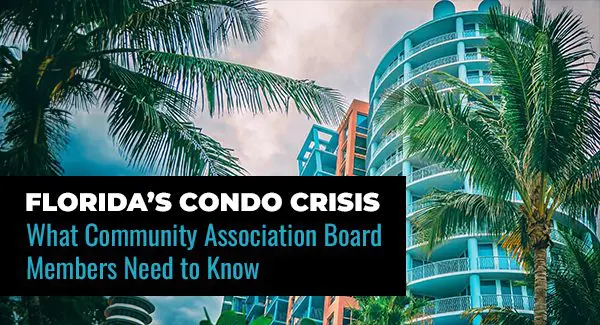- Community Associations, Legal Updates, Finances, Insurance
- Florida
Florida is facing a condominium crisis and it’s one that community association board members can’t afford to ignore.
While condos have traditionally been seen as an affordable path to homeownership, rising costs and regulatory pressure are having ripple effects across communities. Owners, especially those who are retired or on fixed incomes, are struggling to keep up with property taxes, insurance premiums, special assessments, and loan barriers.
For board members, the consequences are immediate and growing. Florida condominium associations are seeing more delinquent assessment payments, higher turnover, property value declines (particularly in older buildings), and increased buyer hesitation. At the same time, many associations remain noncompliant with recent state mandates on structural inspections and reserves that further impact sales and financing options.
Despite these challenges, condominiums remain more affordable than single-family homes—partly because condo values have declined—making them one of the few viable options left for many first-time buyers. In this climate, condos have become the new starter homes but only if associations can keep them financially and structurally viable.
Five Key Factors Driving the Current Florida Condo Crisis
1. Skyrocketing Insurance Costs: After recent hurricanes and natural disasters, insurance premiums have more than doubled in some communities. This is placing severe financial pressure on both owners and community associations. In some cases, insurers have pulled out of the Florida market altogether, forcing associations to turn to less favorable surplus lines or state-backed options—often at a higher cost and with limited coverage.
2. Special Assessments for Repairs and Mandated Upgrades: Many condominium associations are levying special assessments, sometimes in tens of thousands of dollars or more per unit, to fund required repairs and safety improvements. These are often tied to post-Surfside collapse regulations aimed at ensuring structural integrity. For owners on fixed incomes or tight budgets, these assessments are likely unaffordable and may lead to forced sales, mounting delinquencies, or widespread financial strain within communities.
3. Lending Restrictions and the Fannie Mae Unavailable List: There are reportedly over 1,400 Florida condo associations that are “blacklisted” and ineligible for financing through Fannie Mae due to reserve or repair issues. Buyers who can’t obtain financing are walking away from deals, leaving units sitting on the market longer and values declining. This financing bottleneck can have a chilling effect on an entire building.
4. Aging Buildings and New Compliance Deadlines: Reportedly more than half of Florida’s condos are over thirty years old. Under new state laws, these buildings must undergo milestone inspections and begin reserve funding. Many have not yet complied, exposing condominium associations to potential legal risk and market resistance. The cost of compliance, both in terms of time and money, has caught some associations off guard, particularly those that deferred maintenance or lacked proper reserve planning for decades.
5. Delinquent Assessments Are on the Rise: As ownership costs increase, more owners are falling behind on assessments. As assessments are the lifeblood of the association’s finances and budgeting, these delinquencies affect the community’s cash flow and stability. Without a proactive collection policy in place and proper legal guidance, boards risk falling into financial shortfalls where communities lack the funds to make needed repairs or maintain common areas, which further drives down property values and owner morale.
Legal Guidance and Proactive Planning
In this challenging climate, Florida condominium association boards must work hand-in-hand with their association attorney and professional team (ex. management, accounting, insurance broker). Several best practices include:
- Reviewing and updating governing documents (ex. declaration, rules and regulations)
- Drafting or revising the association’s collection policy to clearly outline owner assessment responsibilities, define late payments, and note enforcement procedures
- Ensure assessment collection procedures comply with Fair Debt Collection legislation
- Ensuring legal compliance with state mandates on reserves and inspections
- Improving transparency with owners regarding financial needs and obligations
- Navigating special assessments carefully and lawfully
- Identifying financing options for owners and associations
With proactive legal support and sound financial strategy, associations can weather this storm and help preserve both property values and community stability.
Do not hesitate to contact our law firm if you are a Florida board member, property manager, or community association leader with questions about assessment collection, updating governing documents, drafting community rules, and special assessments.
Please call 855-537-0500 or visit www.ksnlaw.com.
Since 1983, KSN has been a legal resource for condominium, homeowner, and townhome associations. Additionally, we represent clients in real estate transactions, collections, landlord/tenant issues, and property tax appeals. We represent thousands of clients and community associations throughout the US with offices in several states including Florida, Illinois, Indiana, and Wisconsin.
Please note the material contained in this article is for educational and informational purposes only and does not constitute legal advice. No attorney-client relationship is established by your review or receipt of the information contained in this article. You should not act on the information discussed in this article without first obtaining legal advice from an attorney duly licensed to practice law in your State. While KSN has made every effort to include up-to-date information in this article, the law can change quickly. Accordingly, please understand that information discussed in this article may not yet reflect the most recent legal developments. Material is not guaranteed to be correct, complete, or up to date. KSN reserves the right to revise or update the information and statements of law discussed in the article law at any time, without notice, and disclaims any liability for your use of information or statements of law discussed on the article, or the accessibility of the article generally. This article may be considered advertising in some jurisdictions under applicable law/s and/or ethical rules/regulations. © 2025 Kovitz Shifrin Nesbit, A Professional Corporation.



